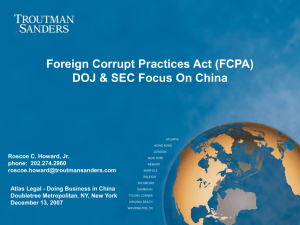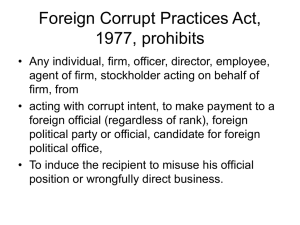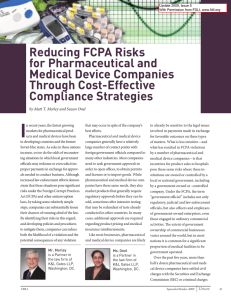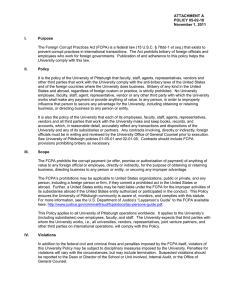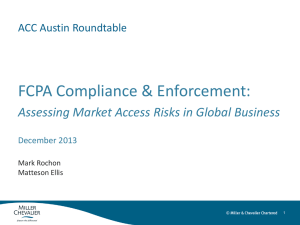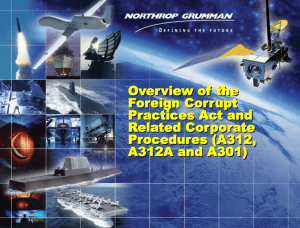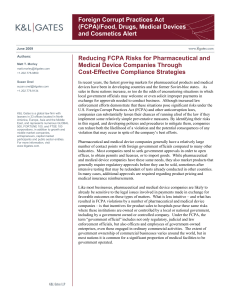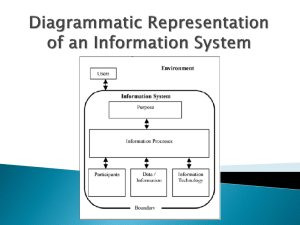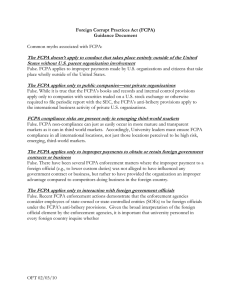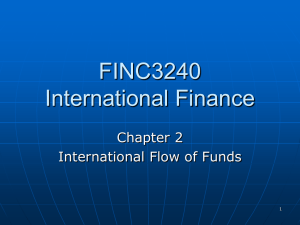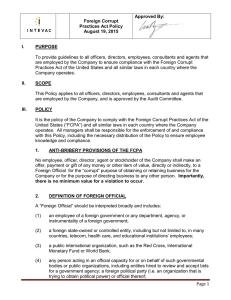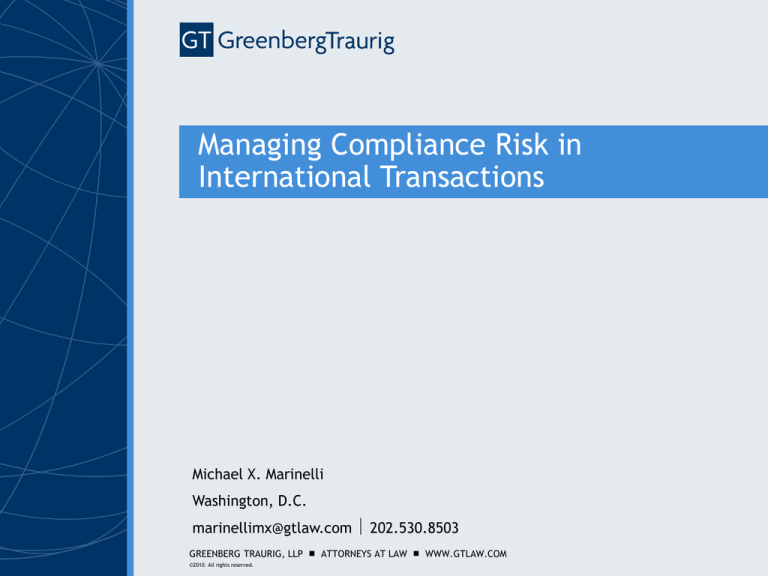
Managing Compliance Risk in
International Transactions
Michael X. Marinelli
Washington, D.C.
marinellimx@gtlaw.com 202.530.8503
GREENBERG TRAURIG, LLP ATTORNEYS AT LAW WWW.GTLAW.COM
©2010. All rights reserved.
Heightened Compliance Risk in Current
Market
Foreign Corrupt Practices Act (FCPA)
□
Aggressive national prosecution strategy
Export controls and trade sanctions
□
Legislation dramatically increased penalties
Practical steps to manage compliance and
control risk
-2-
Transparency International
Corruption Perceptions Index
-3-
FCPA Prohibitions
Paying bribes to foreign officials to obtain
business or other “improper advantage”
Paying money to a third party knowing that the
third party will use it to pay bribes to foreign
officials
Offering, authorizing or agreeing to pay bribes
-4-
Proving Knowledge
Knowledge
□
Positive information that a bribe will be paid
□
Awareness of a high probability that a bribe will be paid
□
Willful blindness
□
Knowledge is most often established by showing the
company ignored “Red Flags”
-5-
Red Flags
Unusual payment patterns or financial arrangements
□
Payments to third countries
□
Payments to parties not involved in the deal
Agents or representatives that do nothing
□
Late-arriving agents
□
Backdated agreements
A history of corruption in the country
Unusually high commissions
-6-
Red Flags
Business partner lacks qualifications or resources
Agent is recommended or selected by the government
customer
Refusal by the foreign business partner to provide an FCPA
certification
Lack of transparency in expenses and accounting records
□
Representative’s records
□
Company’s records
-7-
FCPA Basics:
Exceptions and Defenses
Payments that are lawful under the “written laws
and regulations” of the official’s country
Bona fide and reasonable expenses
Payments to facilitate routine government actions
– “grease payments”
“Everyone does it” (customary payments) is not a
defense
There is no de minimis exception to the FCPA
-8-
Recent Penalty Cases
Siemens: $1.6 billion
□
$450 million in U.S. criminal fines
□
$350 million in profits disgorged to the U.S. government
Halliburton/KBR: $402 million
Baker Hughes: $44 million
ABB Vetco: $26 million
Willbros: $22 million
-9-
Faro Technologies
Paid bribes of $430,000 secure contracts worth
$4.54 million
Internal investigation cost $3.6 million during the
first nine months
Net Income for the same nine months was $4.5
million
Ultimately paid $1 million criminal fine
- 10 -
Practical Lessons
From the Cases
1. Most violations are obvious when they are
happening; don’t ignore red flags.
2. Demands for bribes are common and do not
provide a defense.
3. Be prepared to give up the deal.
4. Make sure employees understand the rules.
5. Conduct and document due diligence on business
partners before you sign the deal.
- 11 -
Practical Lessons
From the Cases
6. Having a compliance program is not enough.
7. Audit compliance on a regular basis.
8. It is the purpose, not the size, of the payment
that matters.
9. The collateral damage can be worse than the
formal penalty.
- 12 -
Export Controls and
Sanctions Regimes
Export Controls
□
Product Based Controls
Classification is the key
Controls apply to goods, software and technology
Controls capture items that we would consider low-tech
□
End-Use Controls
Depend on what the customer will do with the product
Apply to virtually all U.S. products
- 13 -
Export Controls and
Sanctions Regimes
Trade Sanctions
□
Restricted Countries
Cuba
Iran
North Korea
Sudan
Syria
□
Restricted Party Lists
Specially Designated Nationals (Treasury)
Denied Persons (Commerce)
Entity List (Commerce)
- 14 -
Recent Export Cases
ITT: $100 million
Balli: $17 million
Sirchie: $2.5 million
EMD Biosciences: $904,500
Wilden Pump: $700,000
Cryostar: $500,000
- 15 -
Protecting the Company:
Effective Compliance
Management involvement and support
Clearly communicated standards and procedures
□
General policy statements are not enough
□
Procedures tailored to fit the company’s business
□
Train employees and managers
On substance
On process
- 16 -
Protecting the Company:
Effective Compliance
Diligence in Engaging Agents and Distributors
□
Establish objective criteria to be met
□
Document the selection process
□
Document due diligence regarding agent
□
Include compliance language in agreements
Procedures for assessing business information
from the compliance perspective
□
Who is the customer?
□
Is it a government entity? Military entity?
- 17 -
Protecting the Company:
Effective Compliance
Audit and review operations
□
Sales and marketing operations
□
Expense reports
□
Finance operations
Procedures for reporting and investigating possible
wrong-doing
□
Internal reporting mechanism
□
Clear chain of command for response
□
Include legal and finance teams
- 18 -

